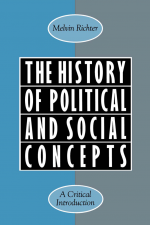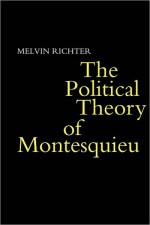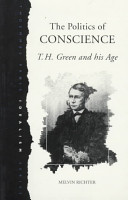1) Emile Durkheim: Politics and Political Theory,” in Kurt H. Wolff, ed., Emile Durkheim. 1858-1917 (Columbus: Ohio State University Press, 1960), pp.170-210.
2) “Tocqueville’s Contributions to the Study of Revolution,” Nomos VIII: Revolution (New York: Atherton Press, 1966), pp. 75-121.
3) “Introduction,” in Essays in Theory and History, ed. Melvin Richter (Cambridge, MA, Harvard University Press, 1970): pp. 1-51.
4) “The Uses of Theory: Tocqueville’s Adaptation of Montesquieu,” in Essays in Theory and History, ed. M. Richter, pp. 74-10.
5) “Theories of the Closed Society,” in The Open Society, Dante Germino and Klaus von Beyme, eds. (The Hague: Mouton, 1975): pp. 99-108.
6) “Modernity and its Distinctive Threats to Liberty: Montesquieu and Tocqueville on New Forms of Illegitimate Domination,” in Michael Hereth and Jutta Höffgen, eds., Alexis de Toqueville-– Zur Politik in der Demokratie (Baden-Baden: Nomos Verlagsgesellschaft, 1981): pp. 61-80.
7)”Aristoteles und der klassische griechische Begriff der Despotie” in Festschrift für Wilhelm Hennis, eds. H. Maier, U. Matz, K. Sontheimer (Stuttgart: Klett-Cotta, 1988): pp. 21-37.
8) “Tocqueville, Napoleon, and Bonapartism,” in Reconsidering DEMOCRACY IN AMERICA,
ed. E. Eisenstadt (New Brunswick: Rutgers University Press, 1988), pp. 110-145.
9) “Zur Rekonstruktion der Geschichte der Politischen Sprachen: Pocock, Skinner and the Geschichtliche Grundbegriffe,” in Alteuropa — Ancien Régime — Frühe Neuzeit:
Probleme and Methoden der Forschung, Hans Erich Bödeker and Ernst Hinrichs, eds. (Stuttgart/Bad Cannstatt: Frommann-Holboog, 1991), pp.134-174.
10) “Remarks on an Apparent Paradox: Tocqueville’s View of Bonapartism as the Real Heir to the Revolutions of 1789 and 1848,” in Politisches Denken Jahrbuch, 2, Volker Gerhardt, Henning Ottmann, Martyn Thompson, eds., (Stuttgart: Metzler Verlag, 1992), pp. 103-109.
11) “‘Begriffsgeschichte’ in Theory and Practice,” in Main Trends in Cultural History, Willem Melching and Wyger Velema, eds., (Amsterdam-Atlanta: Rodopi Press, 1994), pp. 121-149.
12) “Montesquieu’s Comparative Analysis of Europe and Asia: Intended and Unintended Consequences,” in L’Europe de Montesquieu, ed. Alberto Postigliolia (Naples: Liguori Editore; Paris: Universitas; Oxford: Voltaire Foundation, 1995), pp. 317-36.
13) “Rousseau and Tocqueville on Democratic Legitimacy and Illegitimacy,” in Rousseau and Liberty, Robert Wokler, ed., (Manchester: Manchester Unversity Press, 1995), pp. 71-94.
14) “Appreciating a Contemporary Classic: the Geschichtliche Grundbegriffe and and Future Scholarship,” in The Meaning of Historical Terms and Concepts. New Studies on Begriffsgeschichte, eds. Hartmut Lehmann and Melvin Richter, (Washington, D.C.: German Historical Institute, 1996.) Occasional Paper No. 15, pp. 7-19. Reprinted in Finnish Yearbook for Political Thought (Jyväskylä, 1997), pp. 25-38; Italian translation Filosofia Politica, 1997.
15) Co-translator, Reinhart Koselleck, “A Response to Comments on the Geschichtliche Grundbegriffe,” in The Meaning of Historical Terms and Concepts, eds. Lehmann and Richter, pp. 59-70.
16) “Europe and the Other in Eighteenth Century Thought.” In Politisches Denken Jahrbuch,3, Volker Gerhardt, Henning Ottmann, Martyn Thompson, eds., (Stuttgart, Germany: Metzler Verlag, 1997), pp.25-47.
17) “Théorie et pratique de la méthode comparative chez Montesquieu, “Actes du Colloque International pour commémorer le 250ème anniversaire de la publication de l’Esprit des lois (Bordeaux: Académie Nationale des Sciences, Belles-Lettres et Arts, 1999), pp. 127-38.
18) “A German Version of the Linguistic Turn: Reinhart Koselleck and the History of Political and Social Concepts (Begriffsgeschichte),” in The History of Political Thought in National Context, eds. Dario Castiglione and Iain Hampshire-Monk (Cambridge: Cambridge University Press, 2000), pp. 58-79.
19) “Élie Halévy as Historian of Ideas, their Reception, and Paradoxical Consequences,” in Élie Halévy e l’era della tirannie (Rome: Rubbettino, 2001).
20) “Tocqueville and French Nineteenth-Century Conceptualizations of the Two Bonapartes and their Empires,” in The History and Theory of Dictatorship, eds. Peter Baehr and Melvin Richter, (Cambridge: Cambridge University Press, 2004), pp. 83-102.
21) “David Hume on Comparison: From Philosophy to Political Theory and History,” in Politik, Moral und Religion—Gegensätze und Ergänzungen Festschrift zum 65. Geburtstag von Karl Graf Ballestrem, ed. Lothar Waas, (Berlin: Duncker & Humblot, 2004), pp. 343-358.
22)”The Deposition of Alexis de Tocqueville?,” in Tocqueville et l’Esprit de la Démocratie Numéro spécial bicentenaire (1805-2005) (Paris: Presses de Sciences Politiques, 2005),pp. 429-64.
23)“Tocqueville on Threats to Liberty in a Democracy,” in The Cambridge Companion to Tocqueville,” ed. Cheryl Welch (Cambridge: Cambridge University Press, 2006), pp. 245-75.
24)”The Comparative Study of Regimes and Societies in Eighteenth-Century Europe,” in The Cambridge History of Eighteenth-Century Political Thought, eds., Mark Goldie and Robert Wokler, (Cambridge: Cambridge University Press, 2006), pp.147-171.
25) “Reinhart Koselleck’s Impact on Scholarship outside Germany,” in Reinhart Koselleck (1923-2006). Reden zur Gedenkfeier am 24. Mai 2006, eds. Neithard Bulst and Willibald Steinmetz, Bielefelder Universitätsgespräche und Vorträge, 9 (2007), pp. 61-66.
26) “Oriental Despotism,” in The Classical Tradition,” eds. Anthony Grafton, Glenn Most, Salvatore Settis, (Cambridge, Mass.:Harvard University Press, 2010).
27) “Preface to Korean translation of The History of Political and Social Concepts, A Critical Introduction (Hallym, Korea: Hallym University Press, 2011.



